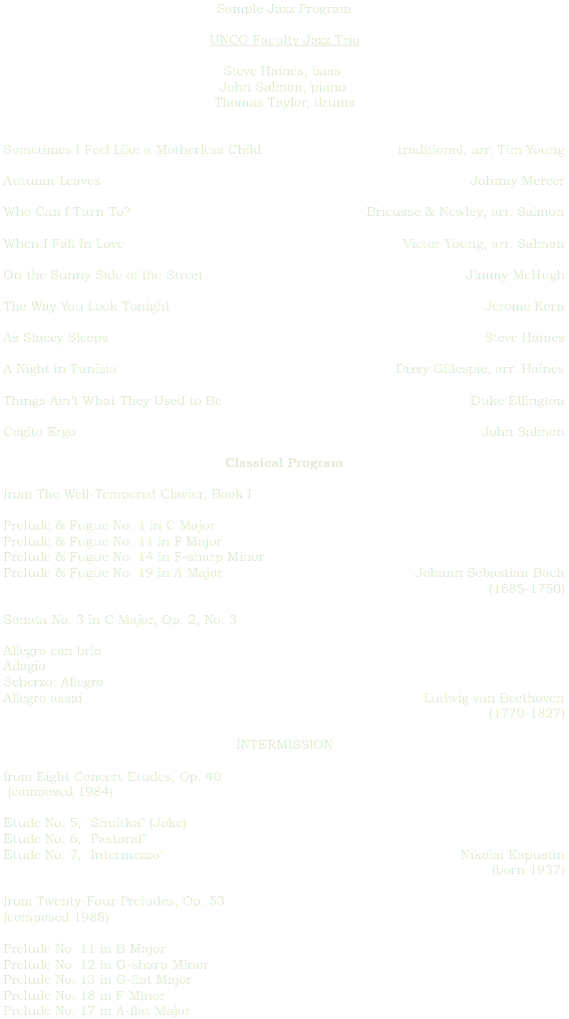John Salmon, pianist

Programs

Download more sample Programs in PDF Format:
"EXCITING PRESENCE ON THE CONCERT STAGE...polished virtuosity and pellucidity of phrasing...an ebullient spirit...nothing less than enchanting."
"What mastery and virtuosity this pianist possesses!" La Suisse (Geneva, Switzerland)
“With true mastery, he performed etudes of Debussy, Chopin, Scriabin, and Liszt, and the sonata of Samuel Barber. The warmest applause came from the audience, whom the artist treated to two encores by Dave Brubeck.” Il Gazzettino (Farra d’Isonzo, Italy) "A remarkable personality, an extraordinary talent, and a sum of qualities which inspires admiration of which only true musicians are worthy." Commercio do Porto (Porto, Portugal)
"Upon beginning his jazz improvisations, the pianist confessed that his problem was not knowing when to quit. According to the response from the audience, he could have continued until the early morning hours." La Nación (San José, Costa Rica)
"John Salmon's performance showed why he has won so many competitions. His playing could be both bold and breezy...elegant, engaging, even ingratiating." Shreveport Journal (Shreveport, Louisiana)
Notes on Kapustin
Nikolai Kapustin, born in 1937 in Gorlovka, Ukraine, is one of those rare musicians thoroughly steeped in jazz and classical music. He studied piano at the Moscow Conservatory with Alexander Goldenweiser, perfecting Chopin, Liszt, and Rachmaninoff. After his graduation in 1961, he toured the Soviet Union for 11 years with the Oleg Lundström Jazz Orchestra. Since the mid 1980s, he has devoted himself almost exclusively to composing, and has produced over 100 works, including 12 piano sonatas and 6 piano concertos.
My first acquaintance with Kapustin's music came through Steven Osborne's CD on Hyperion, released in 2000, which includes the first two piano sonatas and several of the Preludes, Op. 53. In spring 2004, Hyperion released Marc-André Hamelin's recording of Kapustin's piano works, which includes the Eight Concert Etudes, Op. 40. Nikolai Petrov has also recorded some Kapustin, as well as Kapustin himself. The music is not yet published in the west.
The music brings to mind the following hybrid: What if Rachmaninoff lived in Oscar Peterson's body? The result—virtuosity with swing, pianistically full textures couched in jazz harmonies. Kapustin's music is all written-out—every last detail—so no improvisation is called for. But, at some points, the music lopes along with a true stride feel straight out of Erroll Garner or with lean, blazing licks rivaling Chick Corea.
Etude No. 5, "Shuitka," is certainly no joke for the poor pianist, charged with keeping a constant, semi-dodecaphonic series of eighth notes going in the left hand, while the right hand hammers out blues chords. The piece is a wacky boogie-woogie, whose relentless intensity makes me call it the "Industrial Strength Boogie-Woogie."
Etude No. 6, "Pastoral," may be too virtuosic for anyone to think about sitting underneathe the trees on a warm spring day. The melody sounds vaguely Appalachian, vaguely banjo-esque, and the spirits are cheery.
Etude No. 7, "Intermezzo," starts out like a lazy stride piece with rich chords, something Art Tatum might have improvised. Indeed, I think of Tatum's version of "I'm In the Mood for Love," in D-flat major, the same key as this Intermezzo. At the second chorus, however, a flurry of right-hand thirds breaks out, becoming increasingly wild and furious. I always imagine, "What if Art Tatum had played Chopin's 'Thirds Etude,' Op. 25, No. 6 ?"
Prelude No. 11 is a slow, grinding Memphis blues in 12/8 meter. A cloud of Marlboros thickens the air, the drink of choice isn't Dr. Pepper, guitars twang. It is hard to believe Kapustin has never set foot in the United States, let alone on Beale Street.
Prelude No. 12 sounds, variously, like an Argentinean tango or a 1970s TV detective show. Swing emerges midway through, gliding by eight different key centers in as many seconds.
Prelude No. 13 sounds like a tribute to Dave Brubeck's and Paul Desmond's "Take Five," an inevitable consequence of the opening comp and five beats to the measure. The mood is definitely Desmond—subdued and lyrical (for awhile, anyway). The key, G-flat major, is another link, being the relative major of "Take Five"'s E-flat minor. Prelude No. 18 is a medium swing bagatelle in 3/4 meter. As in all of Kapustin's works, the chords are rich and the tonalities fleeting.
Prelude No. 17 sometimes reminds me of what one of those novelty pianists used to play on the Lawrence Welk Show—a hopelessly hokey rag on a rigged piano. But this prelude, so drenched in high-spirited virtuosity and sophisticated harmonies, is too compelling to be called camp. I wonder what James P. Johnson, the "Father of Stride," would have thought if, through some fantastic displacement of chronology, Nikolai Kapustin had entered one of those Harlem apartments in the 1920s where a Rent Party was taking place (all the best stride pianists together in one place, trying to outdo each other), and played this prelude? The "P" might then have stood for "Pummeled by Kapustin."
---John Salmon